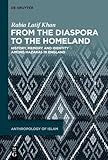From the Diaspora to the Homeland : History, Memory and Identity among Hazaras in England / Rabia Latif Khan.
Material type: TextSeries: Anthropology of Islam ; 4Publisher: Berlin ; Boston : De Gruyter, [2024]Copyright date: 2025Description: 1 online resource (X, 197 p.)Content type:
TextSeries: Anthropology of Islam ; 4Publisher: Berlin ; Boston : De Gruyter, [2024]Copyright date: 2025Description: 1 online resource (X, 197 p.)Content type: - 9783111343464
- 9783111343914
- 9783111343532
- 942.004942
- online - DeGruyter
- Issued also in print.
| Item type | Current library | Call number | URL | Status | Notes | Barcode | |
|---|---|---|---|---|---|---|---|
 eBook
eBook
|
Biblioteca "Angelicum" Pont. Univ. S.Tommaso d'Aquino Nuvola online | online - DeGruyter (Browse shelf(Opens below)) | Online access | Not for loan (Accesso limitato) | Accesso per gli utenti autorizzati / Access for authorized users | (dgr)9783111343532 |
Frontmatter -- Acknowledgements -- Preface -- Contents -- Introduction -- Chapter 1 Hazara history -- Chapter 2 Hazara migration -- Chapter 3 Master narratives and memory -- Chapter 4 Contemporary Hazara historiography -- Chapter 5 Hazara ethnic consciousness -- Chapter 6 The place of religion -- Chapter 7 “Hazara” as a political identity -- Chapter 8 Political mobilisation and Hazara transnationalism -- References -- Index
restricted access online access with authorization star
http://purl.org/coar/access_right/c_16ec
Historically, Hazaras were a marginalised ethnic and religious community in Afghanistan. They were perceived as the 'labourer class' in the country for many decades. In turn they were at the bottom of the country’s social hierarchy. However, since the 1990s and early 2000s, Hazaras have made great strides in various fields. After the fall of the first Taliban regime in 2001, Hazaras gained greater visibility in Afghanistan. This shift in the community’s circumstances, predicated on educational success and an active civil society significantly impacted self-perceptions within the community, moving away from marginality and towards continued success. Thus shifting internal perceptions of Hazara identity and what it means to be Hazara in the present. The internalised negativity associated with being Hazara in the past has diminished, and there is now growing community confidence, political mobilisation and ethnic consciousness among transnational Hazaras. As a result, Hazara identity has shifted from being perceived as a marginalised identity to an identity which is now positively affirmed and proclaimed within the community, globally. This shift within the community, which has tremendously impacted Hazara ethnic consciousness, is the focus of this book.
Issued also in print.
Mode of access: Internet via World Wide Web.
In English.
Description based on online resource; title from PDF title page (publisher's Web site, viewed 20. Nov 2024)


